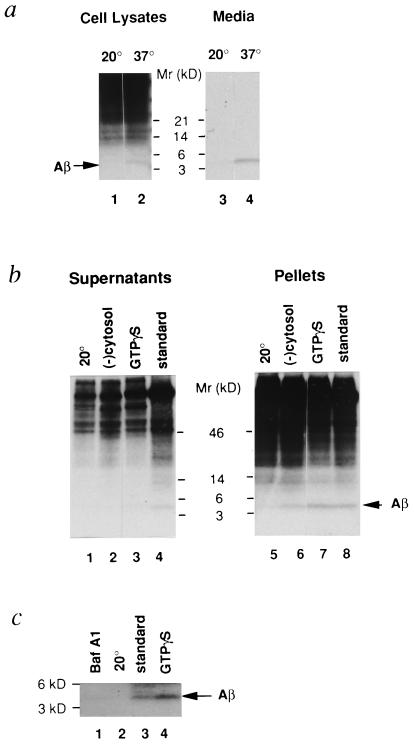Figure 1.
Aβ formation from Swedish βAPP in intact cells (a), permeabilized cells (b), and purified TGN (c). (a) A 20°C block prevents Aβ generation in intact cells. N2a cells expressing Swedish βAPP were pulse-labeled with [35S]methionine at 37°C for 10 min and then further incubated at either 20°C (lanes 1 and 3) or 37°C (lanes 2 and 4) for 2 hr. Samples of medium and cell lysate were immunoprecipitated with antibody 4G8 and analyzed on 10–20% Tricine SDS/PAGE. Arrow indicates Aβ peptide. (b) Aβ generation in permeabilized cells. Cells were pulse-labeled with [35S]methionine at 37°C for 10 min and incubated at 20°C for 2 hr. Permeabilized cells were then prepared as described. Aliquots of permeabilized cells were incubated for 90 min either under standard conditions at 20°C (lanes 1 and 5) or 37°C (lanes 4 and 8), or at 37°C in the absence of added cytosol (lanes 2 and 6), or at 37°C in the presence of 30 μM GTPγS (lanes 3 and 7). Following fractionation, samples of supernatant and pellet were immunoprecipitated with antibody 4G8 and analyzed on 10–20% Tricine SDS/PAGE. (c) Aβ generated in permeabilized cells is recovered in a TGN-enriched fraction. Permeabilized cells that were previously incubated for 90 min at 20°C under standard conditions (lane 2) or at 37°C either under the standard conditions (lane 3) or in the presence of 1 μM baf A1 (lane 1) or 30 μM GTPγS (lane 4) were homogenized, and the postnuclear supernatant was applied to an equilibrium sucrose gradient (12). The TGN-enriched fractions were immunoprecipitated with antibody 4G8 and analyzed on 10–20% Tricine SDS/PAGE.

